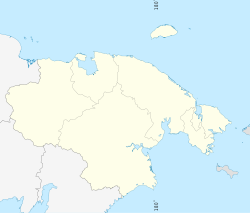Mys Shmidta
| Mys Shmidta (English) Мыс Шмидта (Russian) |
|
|---|---|
| - Urban-type settlement - | |
 Mys Shmidta during winter |
|
 Location of Chukotka Autonomous Okrug in Russia |
|
|
|
|
|
|
|
| Administrative status (as of June 2012) | |
| Country | Russia |
| Federal subject | Chukotka Autonomous Okrug |
| Administrative district | Iultinsky District |
| Municipal status (as of October 2010) | |
| Municipal district | Iultinsky Municipal District |
| Urban settlement | Mys Shmidta Urban Settlement |
| Administrative center of | Mys Shmidta Urban Settlement |
| Statistics | |
| Area (urban settlement) (October 2010) | 137.81 km2 (53.21 sq mi) |
| Population (2010 Census) | 492 inhabitants |
| Population (January 2016 est.) | 193 inhabitants |
| Density | 4/km2 (10/sq mi) |
| Time zone | PETT (UTC+12:00) |
| Founded | 1931 |
| Urban-type settlement status since | 1962 |
| Postal code(s) | 689350 |
| Dialing code(s) | +7 42739 |
Mys Shmidta (Russian: Мыс Шми́дта, lit. Cape Schmidt) is an urban locality (an urban-type settlement) in Iultinsky District of Chukotka Autonomous Okrug, Russia, located about 5 kilometers (3 mi) southeast of the cape of the same name on the shore of the Chukchi Sea (a part of the Arctic Ocean), south of Wrangel Island, about 650 kilometers (400 mi) from Anadyr, the administrative center of the autonomous okrug. The cape, but not the settlement, was formerly known as North Cape (or Cape North). Cape Billings is located to the west of it and Cape Vankarem is to the east. As of the 2010 Census, its population was 492; down from 705 recorded in the 2002 Census.
It was founded in 1931 as a part of the Soviet Union's development of its Arctic air defenses. Changes in the manner in which national defenses are constructed in recent decades have led to a decline in the settlement's importance, although it remains Chukotka's most important main northern sea port after Pevek.
The settlement is positioned on a spit which separates the Akatan Lagoon from the open sea and protects the airport from the full effects of the Arctic Ocean. A little distance to the northwest is the cape from which the settlement gets its name and just beyond this lies the rural Chukchi locality of Ryrkaypiy. Cape Yakan is located further to the west.
...
Wikipedia

